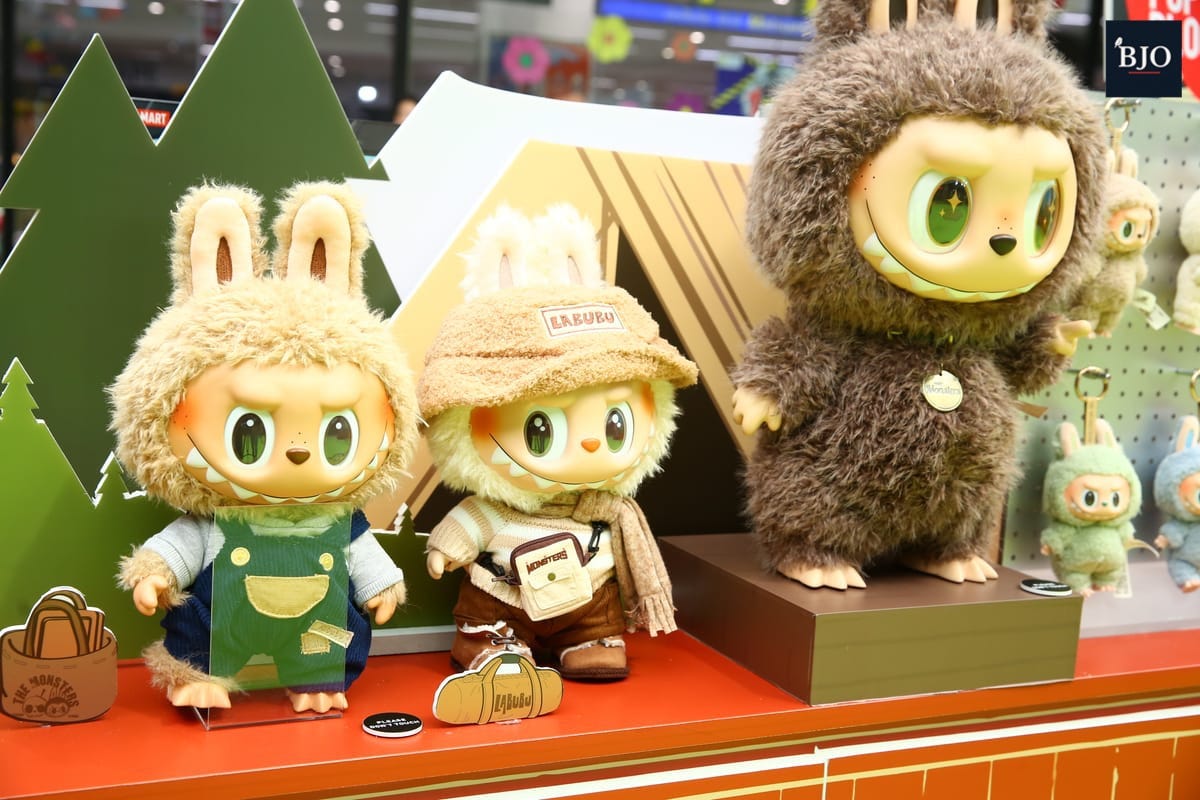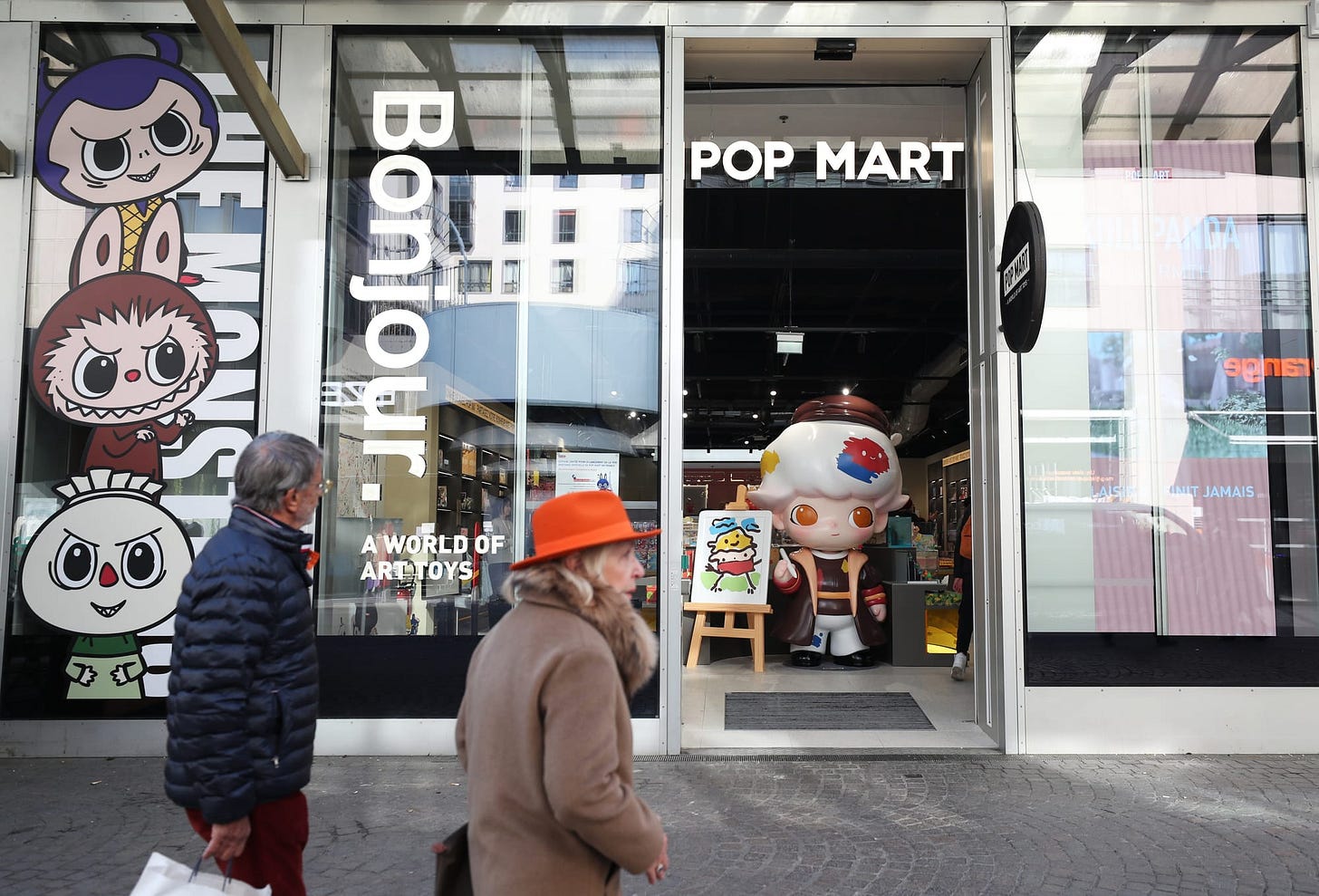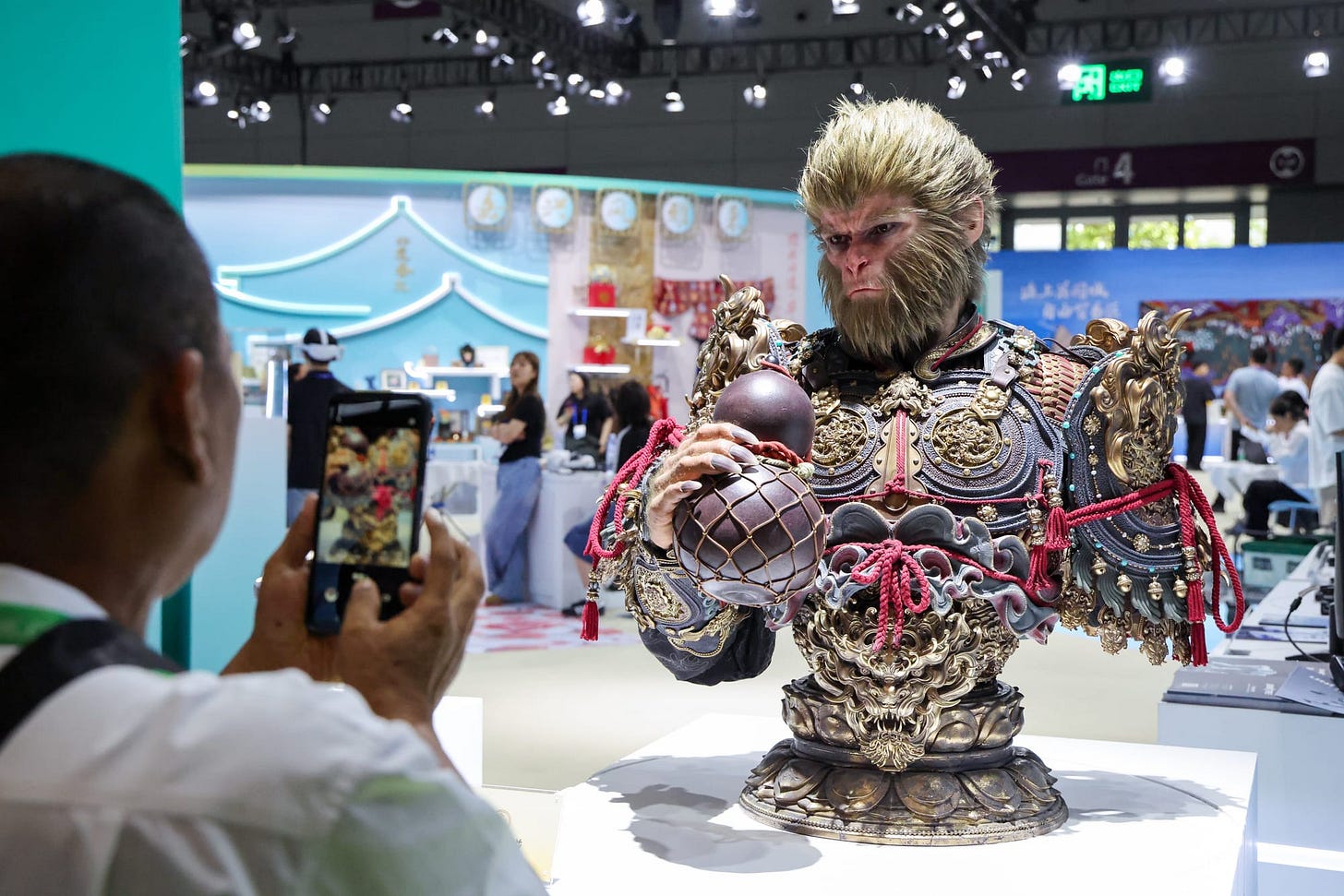Video+Opinion| Crazy For LABUBU: How Chinese IP Took the World by Storm
Beyond LABUBU's viral success, the rise of POP MART and other innovative Chinese IPs signals something even bigger: a new engine of economic growth and a new moment for China’s cultural industries.
Editor’s Note: LABUBU may seem like an overnight global sensation, but behind the worldwide craze for this wide-mouthed, mischievous-eyed doll lies years of dedication and development by POP MART—the company that brought it to life. Beyond LABUBU's viral success, the rise of POP MART and other innovative Chinese IPs signals something even bigger: a new engine of economic growth and a transformative moment for China’s cultural and creative industries.
Where Did It All Begin?
On June 10, during Yongle's 2025 Spring Auction, a mint green, first-generation collector’s edition LABUBU was sold for 1.08 million yuan (150,000 USD). The buyer’s identity remains undisclosed. According to the auction livestream’s notes, this particular LABUBU stands 131 cm tall and is “the only one of its kind in the world.” Additionally, a brown LABUBU from a limited global edition of just 15 units sold for 820,000 yuan (114,000 USD).
LABUBU is one of the characters in POP MART’s exclusive IP THE MONSTERS, created by Hong Kong designer Kasing Lung. Originating from Lung’s 2015 illustrated book The Mysterious Buka, LABUBU is based on an elf from the forests of Northern Europe. With its pointed ears, round eyes, nine jagged teeth, and mischievous grin, LABUBU breaks conventional notions of cuteness. It retains the softness of a plush toy while radiating a quirky, rebellious charm. Upon first glance, people often react with puzzled frowns—“What a strange-looking creature”—only to find themselves strangely drawn in: “Actually... it’s kind of cute.”
In July 2024, Bangkok’s Suvarnabhumi Airport hosted a grand welcome ceremony for LABUBU, even bestowing it with the title “Amazing Thailand Experience Explorer”. In April, the LABUBU 3.0 series was officially launched worldwide. It quickly topped the U.S. App Store shopping charts and sparked global buying frenzies. In Las Vegas, fans lined up from midnight to 7 a.m. to receive purchase cards; everything sold out within minutes of the 10 a.m. opening. In London, chaos erupted due to overbuying, and some products were pulled from shelves. On major online platforms, the purple Milan Fashion Week edition LABUBU is priced at 12,989 yuan (1,800 USD), while the Vans collaboration edition has exceeded 28,000 yuan. In the second-hand market, prices have skyrocketed many times over.
“Many people think we’re a new company, but POP MART is already 15 years old,” said company Chairman and CEO Wang Ning in a previous interview. “We’ve been around a while, yet we still remain vibrant. Same goes for LABUBU. People think LABUBU came out of nowhere—but next year marks LABUBU’s 10th anniversary, and the year after will be MOLLY’s 20th. So, it’s probably older than you think.”
‘GOODS’ Make Me Feel GOOD: The Rise of Pleasure-Driven Consumption
The term “Guzi” (literally "grains") is derived from the English word “goods.” It generally refers to derivative merchandise based on IPs from comics, animation, games, idols and other ACG (Anime, Comic, and Game) content. The act of buying these items is known as “chi gu” ("eating grains").
Many view the Guzi economy as a key pillar of the rising “feel-good consumption” trend—a phenomenon where consumers happily spend on things that bring them joy. But this is not just hedonism—it often reflects investments in personal development and emotional fulfillment. Market research has shown that the feel-good economy has driven growth in sectors such as skincare, flowers, affordable luxury, pets, tech gadgets, blind boxes, and self-improvement courses. A recent report pointed out that as people increasingly seek quality lifestyles and emotional experiences, self-pleasing consumption has become a new engine for the market.
According to the 2024 China Consumer Trends Report by Trend, a domestic research agency, consumer self-pleasure can be understood through three dimensions: emotional intensity, cultural nourishment, and personal fulfillment.
· Emotional intensity: Consumption today is more about feelings—like falling in love. Whether material or spiritual, purchases must offer emotional value. While product functionality remains key to user satisfaction, consumers increasingly seek emotionally rewarding content and distinct user experiences.
· Cultural nourishment: Culture is becoming central to consumer identity. People are turning to cultural experiences—like reading, visiting museums, or attending exhibitions—to enrich their inner world and relieve the stress of everyday life. The report found that 42.8% of consumers feel products with compelling brand stories or cultural elements bring them more joy.
· Self-fulfillment: In uncertain times, young consumers seek stability through self-growth. Many willingly spend lavishly on hobbies, skills, and self-improvement as a means of empowerment and anxiety relief.
Chinese IP: From Made in China to Created by China
As preparations for the overseas version of “618” (China’s mid-year shopping festival) get underway, LABUBU has already topped search rankings. Cross-border e-commerce insiders revealed that, beyond releasing popular IPs like LABUBU, this year’s campaign will include livestreams featuring international influencers at POP MART’s Beijing theme park.
LABUBU’s global success represents a multi-layered triumph of design, marketing, cultural fusion, and consumer psychology. In today’s world shaped by globalization and digitalization, even a small toy can become a transnational cultural messenger. LABUBU is more than a collectible—it’s a reflection of Gen Z’s emotions, a mirror of contemporary pop culture, and a forerunner in the global rise of Chinese brands.
Its popularity is just the tip of the iceberg in the growing wave of Chinese IPs going global. From video games like Black Myth: Wukong to blockbuster films like Ne Zha, Chinese creative confidence increasingly stems from homegrown R&D. Not long ago, international IPs made up 30% of POP MART’s sales, but the high licensing and royalty fees mainly benefited foreign companies. In recent years, POP MART has poured resources into developing original IPs. So far, four of its IPs have surpassed 1 billion yuan (over 139 million USD) in annual revenue, while another 13 generate over 100 million yuan (over 139,000 USD) annually.
LABUBU dons culturally themed outfits tailored for markets like Thailand, the U.S., and Japan, acting as a bridge between Chinese identity and local culture. Today’s Chinese IPs are moving beyond mere character exports—they tell richer stories that resonate emotionally and culturally with global youth.
LABUBU’s wildfire popularity also reflects international trust in “Made in China.” From design and prototyping to large-scale production, packaging, shipping, and global distribution, China’s mature and efficient supply chains form the backbone of the country’s pop toy exports. As the world’s toy manufacturing hub, China boasts robust industrial clusters, skilled labor, and constant innovation in smart manufacturing and flexible production. This allows IPs like LABUBU to be delivered worldwide with high quality, low cost, and rapid speed.
The ongoing craze for blind boxes showcases China’s ability to strike a balance between industrial scale and product personalization—signalling a leap from “Made in China” to “Created by China.”
Even as we speak, warehouses are shipping out stacks of LABUBU figures and other designer toys to all corners of the world. Plush or plastic, cute or quirky, they carry more than just play value—they carry cultural attitudes, emotional connections, and new ways for China to engage with the world.
This article is composed of paragraphs from CCTV, People’s Daily and 21st Century Business Herald and The Paper.
The video was first published on Bilibili, created by Judy Zhao and her team. Judy Zhao is the CEO of Shanghai Qitong Culture, and a million-followed business influencer. The original link of the video: https://b23.tv/qUbNn36
The views don't necessarily reflect those of BeijingOpinion.





